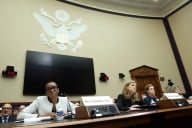You have /5 articles left.
Sign up for a free account or log in.
The news Wednesday that Justice Anthony M. Kennedy was stepping down from the Supreme Court could have a major impact on future rulings on the constitutionality of colleges' consideration of race in admissions.
Justice Kennedy was the author of the two most recent Supreme Court decisions -- both involving the University of Texas at Austin -- upholding universities' right to consider race in admissions. While the decisions were hailed by college leaders who support the consideration of race, both decisions were narrow, setting limits on how colleges could consider race. And earlier in his Supreme Court tenure, Justice Kennedy was dubious of the consideration of race.
Depending on whom President Trump nominates, there may be no immediate indication of how the Supreme Court would rule on affirmative action. And much of the public discussion about the nomination may focus on other issues (abortion or gay rights, for example). So it is unclear how much clarity will come from the nomination and confirmation process.
The last U.S. Supreme Court decision on affirmative action was in 2016, when the court ruled, 4 to 3, to uphold UT Austin’s consideration of race and ethnicity in college admissions.
The ruling was unusual in that it involved only seven judges. Justice Elena Kagan, who worked on the case as solicitor general before she joined the Supreme Court, recused herself from the case. Justice Antonin Scalia, who consistently opposed the consideration by colleges of race in admissions, died several months before the ruling was issued.
The three justices who joined Kennedy's opinion -- Justices Stephen G. Breyer, Ruth Bader Ginsburg and Sonia Sotomayor -- have consistently backed affirmative action. The three justices in dissent in 2016 -- Chief Justice John Roberts and Justices Samuel Alito Jr. and Clarence Thomas -- have generally questioned the right of colleges to consider race in admissions.
Justice Neil M. Gorsuch, who was appointed by Trump, has not ruled on affirmative action while on the Supreme Court and did not handle significant cases on the subject prior to joining it. He has regularly sided, however, with the justices opposed to the consideration of race in admissions. So even assuming Justice Kagan would not need to recuse herself on future cases involving race and admissions, a majority backing the consideration of race may be unlikely. It is worth noting of course that many Supreme Court justices have surprised the presidents who nominated them, although legal observers -- including those who disagree with Trump on many issues -- have generally credited him with picking judges who are reliably in line with the conservatives on the Supreme Court.
In the 2016 Texas decision, Justice Kennedy wrote, "The record here reveals that the university articulated concrete and precise goals -- e.g., ending stereotypes, promoting ‘cross-racial understanding,’ preparing students for ‘an increasingly diverse workforce and society,’ and cultivating leaders with ‘legitimacy in the eyes of the citizenry’ -- that mirror the compelling interest this court has approved in prior cases."
But the decision was far from a laissez-faire approach to college admissions. It says a university considering race in admissions has "a continuing obligation" to meet the legal test of “strict scrutiny” by “periodically reassessing the admission program’s constitutionality, and efficacy, in light of the school’s experience and the data it has gathered since adopting its admissions plan, and by tailoring its approach to ensure that race plays no greater role than is necessary to meet its compelling interests.”
Many critics of college affirmative action plans have said that some institutions fail to meet those conditions set out by Justice Kennedy.
Indeed, in an essay published by Inside Higher Ed shortly after the 2016 ruling, Roger Clegg of the Center for Equal Opportunity, an opponent of the consideration of race in admissions, called the decision "narrow" and said its "silver lining" for those opposed to affirmative action was that it set such strict rules to consider race. So it is unclear how strong Justice Kennedy's support would have been in the future for cases on colleges' consideration of race in admissions.
Currently, a major affirmative action dispute is pending in federal court over Harvard University's admissions policies. The plaintiffs in that case argue that Harvard discriminates against Asian-American applicants, a charge that the university denies.
Student Fees
Another topic on which Justice Kennedy wrote a key decision on higher education involved student fees at public universities. He wrote the unanimous 2000 decision, in a case involving the University of Wisconsin at Madison, finding that public universities could charge mandatory student fees that support various organizations. The Supreme Court decision came in a lawsuit filed by students who objected to some of the groups supported by student fees, and who said that forcing them to pay the fees violated their First Amendment rights. Justice Kennedy's decision said public universities that require student fees must be certain that the method used to distribute funds is "viewpoint neutral" and does not favor some ideologies over others.
Since that decision, there have been numerous legal disputes -- including another one at Madison -- over allegations from various student groups of a lack of viewpoint neutrality on student panels that allocate student fees.








